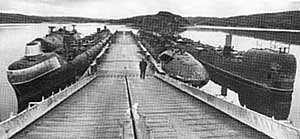
New Managing Director for Bellona Norway
The Board of the Bellona Foundation has appointed former Minister of Climate and the Environment Sveinung Rotevatn as Managing Director of Bellona No...
News

Publish date: July 22, 2002
Written by: Helene Tidemann
News
The Russian newspaper Kommersant was not excited by the decision to allocate $20bn since it was already made back in May at the Russia-NATO summit in Rome when the Italian Prime Minister Silvio Berlusconi announced that the European Union would allocate Russia $10bn for the purpose of 10 years. Colin Powell said at the same time that US would allocate the same amount.
The newspaper believes the decision is no more than political and that Russia should not count on receiving all the promised money. The reason for this is that the western countries will not start the funding before Russia assumes the responsibility of civil liability in the event of accidents on the country that owns the nuclear establishments. For the time being, Russia does not seem willing to take this responsibility.
Kommersant doesnt believe that Russia will gain much financially on this allocation since half of the money earmarked for this program probably will be spent in the donor countries, giving contracts to their own companies to supply equipment and technologies for the destruction of Russian nuclear weapons.
The G8 Russian membership and the decision to allocate money also angered some. Retired Gen. Leonid Ivashov interviewed by Mara D. Bellaby warned that President Putin was leading the country into a potentially dangerous relationship with the West. Communist Party leader Gennady Zyuganov says according to Interfax news agency that despite all the buzz and propaganda, it is clear that the billions on dollars to be allocated to Russia by Western countries are designed to completely annihilate Russias nuclear missile shield.
Some also fear that the Kremlin is moving too quickly into an international bound without receiving any tangible results. Ivashov was concerned about the creation of a unipolar world and warned that Putin was giving up Russias natural position as a counterbalance.
Jon Wolfsthal says in his article It takes more than money that although the decision represents progress, $20 billion is not enough. He refers to the Baker-Cutler report of 2001 where it was recommended a $3 billion support per year for US Department of Energy programs alone. The size of the nuclear waste arsenal and the consequences of the threat it poses, needs at least the same funding as this in order to succeed.
Wolfsthal says further that the money is only a part of the challenge. An international co-ordination of the funding programs is non-existent and co-ordinating the efforts of 7 countries will make past US bureaucratic turf battles on this issue seem like sandbox scuffles. In addition, US and Russia have not succeeded in building trust with each other. Significant changes is required from both sides concerning this issue, like flexible responses to the issue of access to sensitive facilities, acknowledging that expertise from both sides are useful in solving the proliferation problems.
But there is also optimism concerning the Russian G8 membership as well. Ira Strauss writes at the Russian website www.strana.ru of the importance for Russian participation in the G8. G8 is the only important Western grouping that Russia is yet a member of. Russia may soon be a member of OECD, but Russian membership in NATO and EU are not realistic for the moment. The G8 membership is a chance for Russia to increase its role in the world, Strauss says. Russias individual interests as well as common interests are global regulation and stability and the struggle against terrorism is vital to reach this goal.

The Board of the Bellona Foundation has appointed former Minister of Climate and the Environment Sveinung Rotevatn as Managing Director of Bellona No...

Økokrim, Norway’s authority for investigating and prosecuting economic and environmental crime, has imposed a record fine on Equinor following a comp...

Our op-ed originally appeared in The Moscow Times. For more than three decades, Russia has been burdened with the remains of the Soviet ...

The United Nation’s COP30 global climate negotiations in Belém, Brazil ended this weekend with a watered-down resolution that failed to halt deforest...